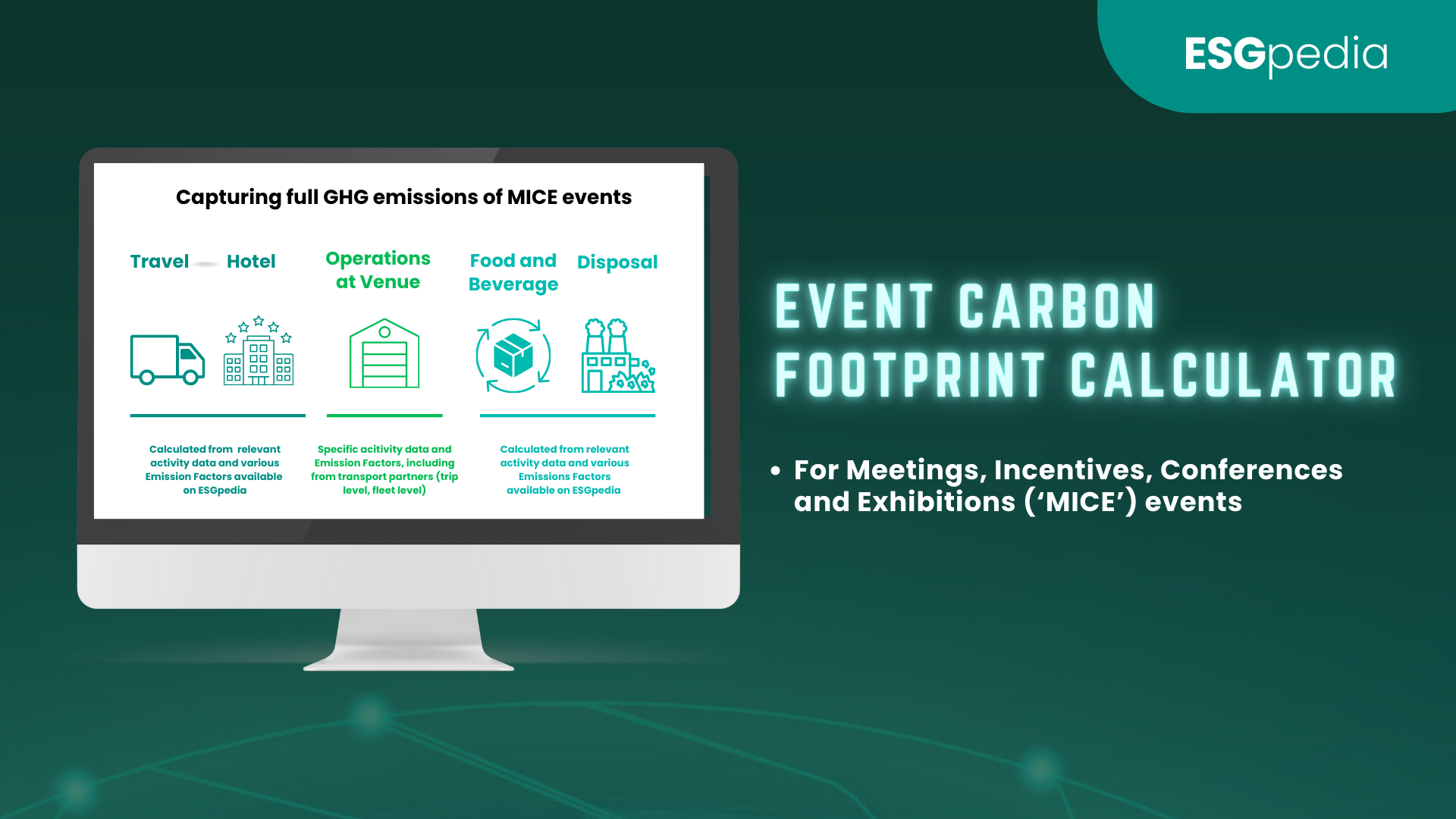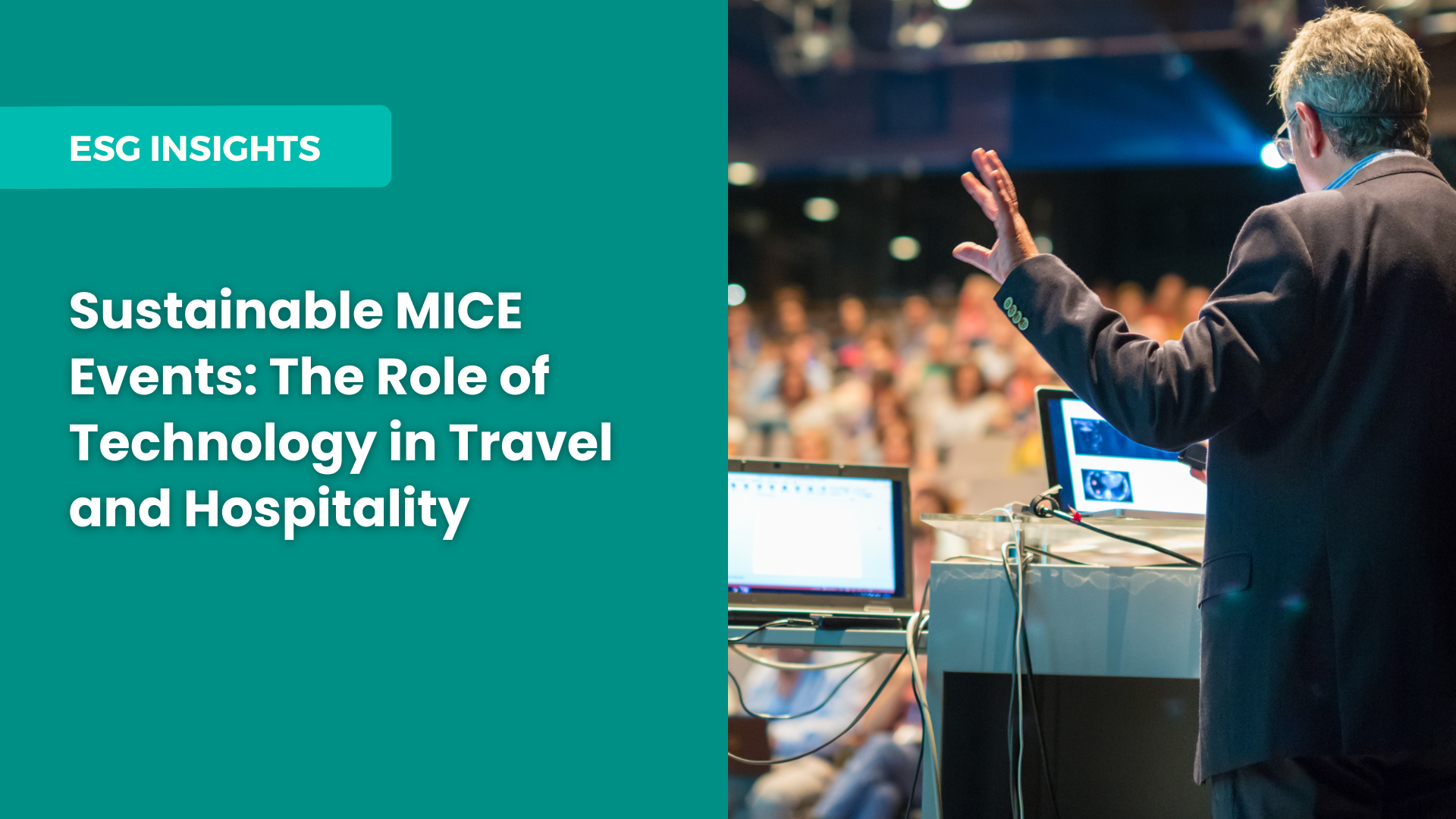Published 10 Feb 2025 –
The travel, hospitality, and MICE (Meetings, Incentives, Conferences, and Exhibitions) sectors are powerful drivers of global economic growth, with the MICE tourism market valued at around US$782.80 billion in 2023 and projected to reach US$1.34 trillion by 2033, according to AltexSoft.
As these industries expand, sustainable practices are gaining prominence. A significant majority of travelers (83%) believe that sustainability is important, with 75% intending to travel more sustainably in the coming year, according to the Global Sustainable Tourism Council (GSTC).
These changing preferences underscore the urgency for businesses to integrate Environmental, Social, and Governance (ESG) considerations into their core operations.
However, implementing effective ESG strategies is not without challenges. Companies must contend with inconsistent measurement standards, high costs, and the risk of greenwashing.
In response, many are turning to digital ESG solutions that offer more accurate tracking, reporting, and improvement of sustainability efforts.
This blog post explores the current state of sustainability in the travel, hospitality, and MICE sectors, the hurdles organisations face, and how technological advancements can help bridge the gap between ESG objectives and operational realities.
Progress in Sustainable Practices: Global and Regional Developments
Growing consumer demand and regulatory frameworks have prompted hotels and event organisers to align with international certifications such as those from the GSTC, while certification bodies like Bureau Veritas and Control Union have expanded into the MICE industry to verify sustainable standards for hotels.
Meanwhile, the cruise sector is exploring green terminals, improved waste disposal monitoring, and alternative fuels such as green methanol and liquefied natural gas (LNG).
Singapore is proactively implementing sustainability measures across its hotel sector, which aims for 60% of hotel room stock to achieve internationally recognised certification by 2025. There is also momentum toward net-zero emissions by 2050.
The Singapore MICE Sustainability Certification, introduced in January 2024, provides a framework that covers management approaches, carbon and waste mitigation, energy and water usage, as well as social and human resource competency, according to Singapore Association of Convention & Exhibition Organisers & Suppliers.
The rest of Asia is likewise aligning its sustainability frameworks with global benchmarks, as demonstrated by Singapore’s efforts to harmonise local standards with international norms.
Macao is stepping up its efforts to become a top choice for global MICE events, and at the same time pushing for its transition towards a sustainable MICE industry. The 2024 Macao International Environmental Co-operation Forum & Exhibition (2024MIECF) showcased Macao’s commitment to decarbonising its MICE sector.
Likewise, Malaysia has taken a critical step towards sustainable tourism in 2024 by launching the Environmental, Social, and Governance (ESG) certification for hotels and resorts.
At the regulatory level, the European Union has taken bold steps with legislation such as the Corporate Sustainability Due Diligence Directive (CSDDD), which requires companies to ensure ethical practices and human rights compliance throughout their global supply chains.
These advances reflect a global commitment to sustainability, with tailored regional strategies that address local environmental and regulatory contexts.
Challenges in ESG Adoption and Measurement of Sustainable MICE Events
Despite making strides toward sustainability, the travel, hospitality, and MICE sectors still face multiple hurdles, with one key challenge around the absence of universal standards for assessing ESG performance.
This lack of consistency complicates benchmarking and comparison across different organisations, and the World Sustainable Hospitality Alliance (WSHA) has stressed the critical role of data in developing global standards that guide resilient sustainability initiatives.
Sustainable solutions often involve sizable initial investments, which can be prohibitive for smaller enterprises, while complex ownership structures in hospitality can also make it unclear whether property owners or hotel operators should fund sustainability measures.
Moreover, available financing frequently favors large-scale projects, leaving smaller property owners at a disadvantage, according to the WSHA.
As consumers, investors, insurers, and capital providers demand clear ESG strategies, transparency becomes paramount. Yet some organisations resort to greenwashing — projecting a superficial image of environmental responsibility — causing skepticism among stakeholders.
Increasingly, institutional investors are inclined to avoid companies with poor ESG performance, and many business travelers now prefer working with ESG-committed organisations.
Regulatory frameworks like the EU’s CSDDD add layers of complexity for businesses operating across multiple regions, and companies must navigate diverse legal requirements while ensuring ethical practices and human rights compliance in their global supply chains.
Successfully doing so necessitates a thorough understanding of various regulations and robust internal processes to meet them.
How ESG Technology Is Driving Change for Sustainable MICE Events, Hospitality, and Travel
The integration of technology into ESG strategies is transforming sustainability efforts in travel, hospitality, and MICE, enabling greater operational efficiency and more meaningful stakeholder engagement.
Advanced digital tools help businesses optimise routes, resource usage, and energy consumption. MSC Cruises, for example, is using technology to measure port call sequencing, travel times, and ship speeds to cut emissions by up to 15% by 2026.
Consumer-facing platforms also play a crucial role.
Travalyst, led by Prince Harry, collaborates with major travel and tech companies to develop the Travel Impact Model, which estimates per-passenger CO2 emissions for flights. This gives travelers the data they need to pick more eco-friendly options.
Beyond environmental factors, technology aids social initiatives like ensuring pay equity, increasing community engagement, and tackling over-tourism.
Collecting and analysing data on workforce diversity or community impact allows organisations to implement effective DE&I measures and build stronger ties with local communities.
Digital solutions for the hospitality industry can also enable hotels to track Greenhouse Gas (GHG) emissions from their operations, empowering them to track and improve their sustainability efforts.
Citadines Bali became the first hotel in Bali to adopt digital tools to track GHG emissions using IoT devices and calculate their operational emissions through ESGpedia, enabling them to gain sustainable financing from HSBC Indonesia and accelerate their journey towards decarbonisation. Read the press release here.
MICE stakeholders can also build carbon management capabilities by calculating end-to-end GHG emissions of their events with the help of carbon calculation and ESG reporting softwares. Guides such as the Sustainable MICE – Guidelines for carbon emissions management by the Singapore Standards Council and Singapore Association of Convention and Exhibition Organisers and Suppliers (SAECOS) also serve as useful standards to help stakeholders align with national sustainability targets.
Event Carbon Footprint Calculator for MICE events

For instance, as a pioneering use case, ESGpedia has enabled JCI Taipei to calculate and report the event carbon emissions for the 2nd Asia Pacific Young Leaders Summit, as a crucial first step towards achieving carbon neutrality. An event carbon emissions report was generated through ESGpedia for the summit, with event emissions offsetted to make the MICE event carbon neutral. Read the press release here.
Though cost and knowledge gaps remain barriers to widespread adoption, the emergence of innovative collaborations — such as the HRS Green Stay label — helps hotels adopt more sustainable methods, benefitting both the environment and social objectives.
Consumer Trends and Behavioral Shifts in Sustainable Travel
Shifting consumer attitudes reflect a growing willingness to consider the ecological impact of travel. Around 83% of travelers value sustainable options, and 75% intend to adopt more eco-conscious behaviors in the next year, according to Statista and GSTC.
A poll by The Times and The Sunday Times found that younger generations are driving the shift with 47% of Gen Z and 42% of millennials worried about the environmental impact of their holidays, compared to 31% of baby boomers.
Despite good intentions, many travelers perceive sustainable travel as more expensive and find it difficult to locate clear information about eco-friendly choices, while 49% believe sustainable options cost more, and over half say there are not enough green choices available, according to the World Economic Forum and PhocusWire.
Clear communication from travel providers about the availability and benefits of sustainable options can close the gap between travelers’ aspirations and real-world behaviors.
Emerging technologies, including recommender systems that factor in CO2 emissions and destination popularity, further empower travelers to make greener choices.
The Role of Green Certifications and Financing in Overcoming Cost Barriers
High implementation costs often stand in the way of sustainable initiatives, but green certifications and innovative financing can make these efforts more economically feasible.
Programs like Leadership in Energy and Environmental Design (LEED), Green Key, and EarthCheck provide structured frameworks for improving sustainability metrics — energy efficiency, water conservation, waste management, and community engagement.
Achieving certification signals serious environmental commitment and can yield tangible benefits, such as reduced utility bills from energy-saving measures and greater appeal to environmentally conscious guests.
Green bonds — debt instruments designated for environmental projects — are becoming a preferred mechanism for funding upgrades to energy, water, and waste infrastructure, having gained substantial traction in global markets.
By issuing green bonds, hotels and venues can secure the capital needed for sustainable improvements without crippling upfront expenses, while coupling reputable green certifications with tools like green bonds allows properties to balance the initial costs of sustainability projects.
This dual approach not only reduces financial burdens but also positions businesses to appeal to eco-conscious travelers and investors alike.
Encouraging Travelers to Make Greener Choices
Promoting sustainable behavior among travelers is crucial for reducing the overall environmental impact of travel and events.
In Europe, programmes such as Copenhagen’s “CopenPay” offer rewards like free meals or coffee for using public transit or volunteering in local clean-ups, providing incentives that encourage responsible tourism and foster a positive connection between visitors and residents.
Nudge theory involves gently steering people toward more sustainable behaviors without restricting their choices.
For example, in hospitality, defaulting to towel reuse programmes or presenting information about the energy savings from reusing linens can significantly increase participation.
Making green options more accessible — including better public transportation details and sustainability filters on booking platforms — helps travelers make informed, eco-conscious decisions.
Pre-trip resources and on-site signage also deepen awareness and reinforce positive behaviors.
Advancing Sustainability in MICE, Hospitality, and Travel
The travel, hospitality, and MICE sectors are at a pivotal moment in advancing sustainability. Heightened consumer awareness, complex regulations, and the urgency of climate action compel businesses to prioritise ESG considerations.
Although high costs, inconsistent measurements, and greenwashing fears persist, emerging solutions — ranging from ESG-focused technology platforms to green bonds — are proving effective at guiding organisations in these sectors toward more authentic and transparent sustainability efforts.
At the same time, travelers themselves are seeking greener, more responsible options, even though they often face challenges in identifying practical and affordable solutions.
Bridging this gap requires clear communication, greater accessibility, and strategic nudges that make sustainable travel second nature rather than a premium alternative.
Ultimately, the key to a resilient future lies in collective action. Through collaboration across governments, corporations, and individual travelers, the industry can meet evolving stakeholder expectations while remaining profitable and environmentally responsible.
If your MICE, hospitality, or travel organisation is ready to embrace data-driven ESG strategies and strengthen its sustainable initiatives, learn more about how ESGpedia can support your journey at www.esgpedia.io.




